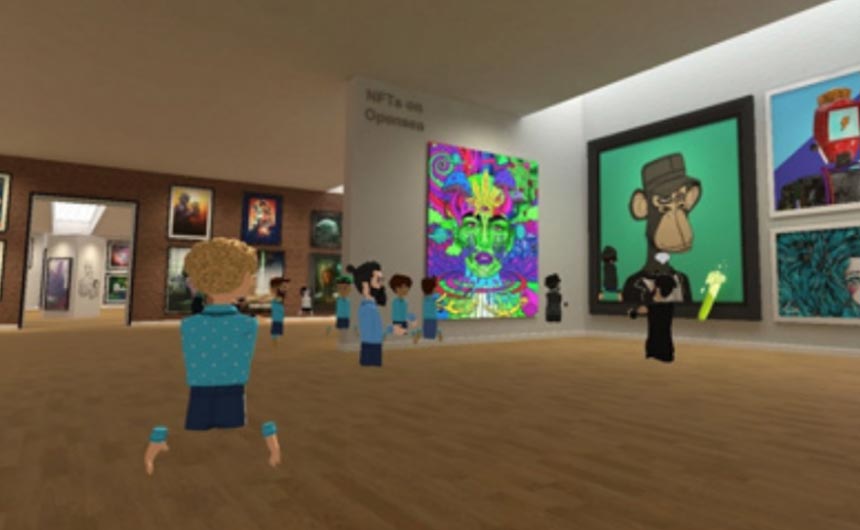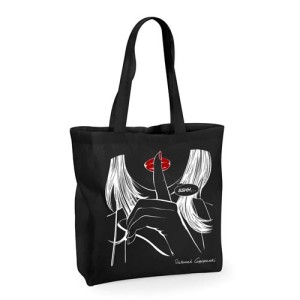Russ Singler (Metagallery.Ltd) and Warren Parker-Mills (beforeStores) met in AltspaceVR two years ago and have been collaborating ever since on all things metaverse and Web 3.0. They are also speaking at Licensing for Retail on 19 April at Convene in London about Beyond online vs physical experience – How will we shop in 10 years? Coincidentally, it will be their first ever physical meeting.
Over 140 retailers will attend Licensing for Retail and a handful of networking tickets are now available for non-retailers starting from just £85.
How will [online] retail evolve to include ‘experience’ and what role do you think the Metaverse will play?
Russ: I’m all about ‘the experience’. When lockdown happened, I became obsessed with AR and VR and how it could be used to deliver experience. It was a natural extension to what I’ve always done, which is engaging customers with licensed product through experiential events and activations. The acceleration of retail delivering a worthy experience came out of the necessity for businesses to continue providing a service during the pandemic, and it essentially cut five years off the development time of everything.
The United States is a great inspiration for online retail. Go to New York everything’s online and deliverable within the hour; Amazon has driven that mindset and expectation for years, but that’s not necessarily a bad thing because it’s making smaller independents up their game. Even without Amazon’s infrastructure, retailers can still provide a great service and – for me – the crux of retail lies in the ‘experience’ of buying things.
People buy from people, and the personality of those people is reflected in the brand. Even with bigger brands, the personality or ‘culture’ comes from the top down. Retail is about one individual’s engagement with the brand and how they engage in that process.
So, even though it was niche, I created immersive environments that allowed people to connect with a brand through VR or their computer. For example, we sold art simultaneously with buyers attending physically at the Samsung Experience Store, London and virtually in the metaverse. This hybrid approach is where we enable brands to be right now.
 Most people don’t understand what Web 2.0 or the metaverse is or how it can work for them or what the hell Web 3.0 is, and the High Street won’t benefit until there are good product cases for the consumer, so we hand-hold brands and retailers to bridge the gap and embrace ‘Web 2.5’.
Most people don’t understand what Web 2.0 or the metaverse is or how it can work for them or what the hell Web 3.0 is, and the High Street won’t benefit until there are good product cases for the consumer, so we hand-hold brands and retailers to bridge the gap and embrace ‘Web 2.5’.
Shaketastic is a great example, incorporating a licensing and Web2.5 mechanic. Consumers go into store and buy a Bored Ape milkshake. They get a sticker with a QR code, which takes them to the website where they claim an exclusive digital token (NFT) to claim a free topping in-store. It also enrols them into an exclusive community giving them a closer relationship with the brand: an immersive chat with the CEO, advance access to new drink flavours, exclusive merch, and more. It’s important for us that there is real and tangible benefit to the Web3 activation.
Warren: Shopping over the next 10 years will be a blended retail environment – mixing digital and physical [some call it ‘phygital’]. Blockchain is an important element of Web 3.0 because it allows you to understand a brand and product’s provenance and authentication, and transparency in the supply chain, which licensees need to demonstrate to consumers. Digital wallets will be huge in the next 10 years (in fact they are already but often not branded as such) as well as cryptocurrency in the form of a ‘coin’ or ‘token’.
Russ: One off-putting part of Web 3.0 is the jargon. Not just the technicalities of it, but also the associations with various sensationalist headlines. We’ve seen that with NFTs, now referred to as digital tokens. So, jargon isn’t necessary for brands to get on board. Over time, the disconnect will narrow and we’ll start to see purchasing and mechanics on Blockchain, consumers (and brands) will then start to enjoy the experience to be had from buying, collecting, gaming and belonging.
Warren: What’s exciting is how accelerated it’s become. We’ve seen solutions come through in the last two or three months that we were not anticipating for another year or so.
We can already see consumers being a little bit more knowledgeable about where everything’s coming from. There is a link between sustainability and the metaverse, from a supply chain perspective, an efficiency perspective and a transparency perspective. Brands, retail and licensing can be more efficient by using Web 3.0 technology or even Web 2.5 technology as it stands.
Blockchain transactions change the relationship between the supply chain, brand and consumers and allow a level of transparency and provenance not seen before.
Having over 30 years in the retail industry, I could see how retailers were slow to adapt to new tech with Web 2.0, the arrival of online was met with reluctancy. It’s imperative retailers get onboard now with these enhanced tools. It’s not enough to stick to doing what you’re good at.
Can bricks and mortar compete, and if yes, how will it have to evolve to do that?
Warren: The retailers that stand the test of time in the future will be no different to the retailers from 40-50 years ago whose focus was on service, storytelling and quality.
I believe that bricks and mortar will stay, but it will look very different. Retailers will use technology a lot more – specifically AI, AR and VR – to give consumers a more immersive experience. I think we’ll see the High Street refocusing on service, too, which is what makes them unique to ecommerce. The Apple stores are a great example. You go in there because you enjoy the whole experience. As we start blending digital avatars, it will be Apple-store style experiences on steroids. I think that’s where retail will come through, but how successful they’ll be depends on the retailers and the brands adopting a new mindset and breaking away from what they did previously.

Russ: One of the biggest barriers is having alignment from top down, because if you’ve got politics, financial agendas and differing expectations across the company, you’re going to fall short, and consumers will smell a cash grab. It has to offer a value proposition for the consumer.
We’re seeing some High Street retailers already customising spaces for immersive activities and events. We all know retail must change and is changing because consumer’s expectations are changing. Over the last 20 years we’ve seen big institutional stores gone because they didn’t, or couldn’t, change. People’s habits change and retail needs to be nimble and change with it – but, and speaking with experience, you need to be careful of being too ahead of the curve or you’ll disconnect with your audience. We all want to include these amazing new technologies for people to interact with the brand, but if you do too much it goes over people’s heads, they don’t get it and they won’t return to it. Which is why we are advocates for Web 2.5. And the cool thing is you don’t need to do a lot to have a real point of difference at this stage.
I agree with Warren that the future of bricks and mortar will be AR focused. You may wear glasses that immerse you in environments that will be triggered when you walk into store. You’ll have your own identifiers through your digital wallet purchases or through avatars linked to those wallets. Because of Blockchain, you have your own secure presence that you’ll be able to take across the retail landscape, including immersive environments instore. And that’s how people will evolve their online identities. You may have even already made the purchase online, but Web 3.0 will encourage you instore or ‘in-world’ for exclusive content or offers.
What’s your last word to retailers?
Russ: Start building now. We may be two to three years away from mass adoption, but that’s not long. You have a social strategy, well you need a Web 3.0 strategy now to build engagement, loyalty, and ultimately, revenue.
Warren: I think the metaverse is a huge opportunity. McKinsey forecasts that by 2030, the metaverse will be worth $5 trillion, and $2.6 trillion of that will be from ecommerce. So, there’s enough to go around and it’s a question of adapting the business that you’ve got at a pace that you and your teams are comfortable with (so as not to burn loads of cash). But I do believe that, finally, people are realising that you can do a lot for less.
 Why are you looking forward to attending Licensing for Retail?
Why are you looking forward to attending Licensing for Retail?
Russ: There is going to be such a variety of businesses in the Licensing for Retail audience, from licensing to brands, to representatives to agents, all with different agendas, all trying to connect the dots. Between Warren and me, we’ve touched probably every aspect of the retail and licensing industry; retail activations, manufacturing, supply chain, product creation, marketing and events, digital strategies and more. Because I’m all about the ‘experience’ I’ve been building Web 3.0 user cases for the last two years to demonstrate the effectiveness I can’t wait to chat to everyone.
Warren: There’s a lot of ‘Meta-Washing’ out there, and it’s important to remember that although many people profess to be an expert, the metaverse as a ‘whole’ doesn’t exist. There are some incredible people within the space with technical experience and some incredible people within the eco system with commercial experience, but those individuals, with a blend of the two… can be challenging to find.
Russ: We’ll even be issuing Licensing for Retail’s very first Digital Token so attendees can collect their first NFT. They’ll just scan a QR code and claim their first digital asset via email. They can then redeem this token with our merch partner to own an exclusive fashion bag featuring the licensed artwork of Pop Artist, Deborah Azzopardi. This opportunity will demonstrate what we’re talking about. It’s really exciting.
Licensing for Retail Day will take place on Wednesday 19 April at Convene in London. For full details on the event, simply click here.































